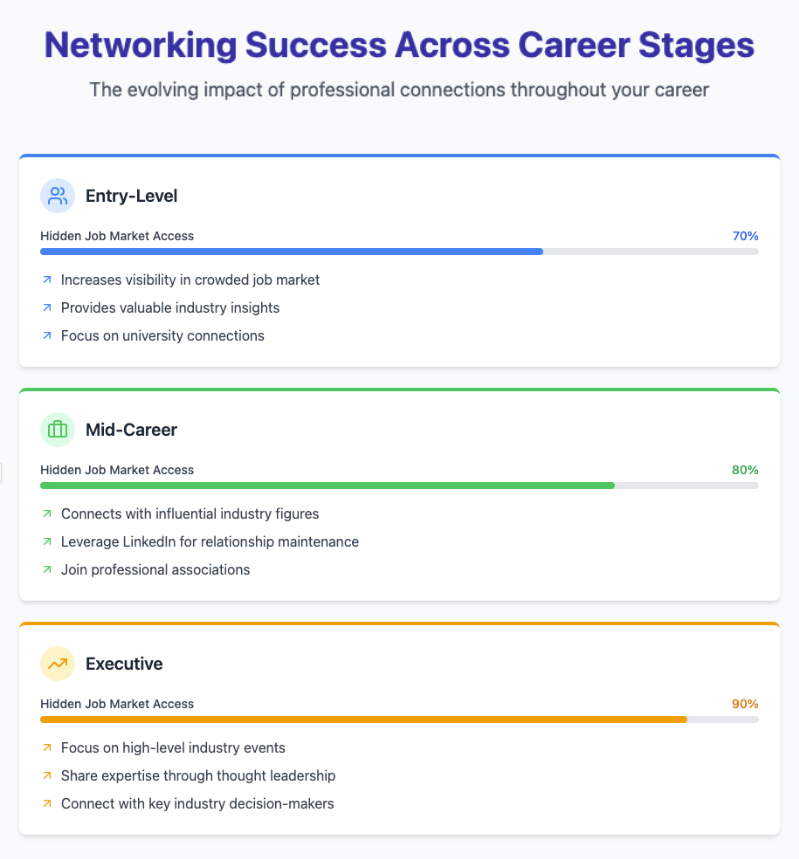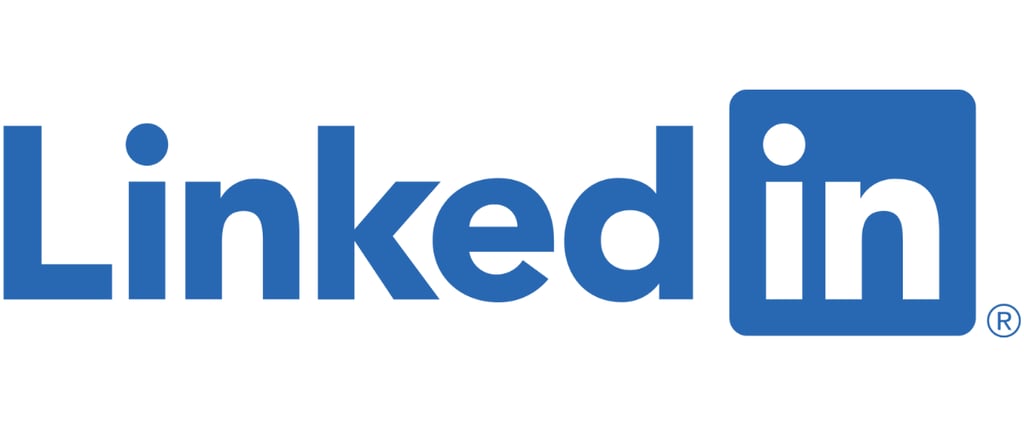The Proactive Network: How Building Connections Prepares You for Interview Success
Discover how networking can increase your interview success by 85%. Learn powerful strategies to build professional connections that provide insider knowledge, referral advantages, and interview confidence in 2025's competitive job market. Includes actionable networking tips from industry experts to help you stand out and secure your dream role.
J Matthew
5/15/20258 min read
The Proactive Network: How Building Connections Prepares You for Interview Success
In today's competitive job market, understanding the secret ingredients to interview success can make all the difference between landing your dream role and continuing the search. While polishing your resume and practicing common interview questions remain essential, there's a powerful element that many candidates overlook: the strategic value of professional networking. As we navigate through 2025's evolving career landscape, the connections you build before you ever step into an interview room may be your most valuable asset for securing interview opportunities and standing out from other candidates.
According to recent statistics, a staggering 85% of positions are filled through networking rather than traditional application methods, highlighting just how critical relationship-building has become in the modern job search process. This article explores how proactive networking not only opens doors to interviews but actively prepares you to excel when those opportunities arise.


The Hidden Power of Networks in Today's Job Market
The employment landscape has transformed dramatically in recent years, with traditional job application methods increasingly giving way to relationship-based hiring. Recent data from 2025 reveals the true scope of this shift: nearly 70% of job positions are never publicly posted on job sites, instead being filled through internal recommendations and professional connections.
This "hidden job market" phenomenon exists because employers prefer hiring candidates who come with a built-in vote of confidence from someone they trust. According to research by LinkedIn, hiring managers are 89% more likely to consider candidates who come through referrals, and these referral candidates are typically hired faster and stay longer with companies.
"Networking is not just about collecting business cards anymore," says Loren Quimbo, PR Professional at Crafty Insights. "Paramount skills include digital fluency, embracing emerging technologies, and staying updated on industry trends."
When job seekers leverage their network connections before applying, they gain several distinct advantages:
Inside information about company culture and expectations
Potential employee referrals that fast-track their applications
Invaluable insights about hiring managers' preferences
Early notification about upcoming positions before public posting
The Networking Advantage at Every Career Stage
Whether you're a recent graduate or a seasoned professional, networking provides unique benefits tailored to your career stage. Studies show that 78% of new graduates credited networking as influential in their job search, while 75% of professionals attribute their business growth directly to networking efforts.
For entry-level candidates, networking opens doors to mentorship and guidance. For mid-career professionals, it provides access to leadership opportunities and industry intelligence. For executives, it establishes strategic partnerships and industry influence.



Building Your Strategic Network for Interview Preparation
Effective networking goes beyond collecting connections—it's about building relationships that provide genuine value to both parties. The most successful networkers approach relationship-building with authenticity and a clear purpose.
Identify Your Networking Goals
Before diving into networking activities, take time to reflect on what you hope to achieve. Are you seeking industry insights, company-specific information, or direct referrals? Having clarity about your objectives allows you to focus your networking efforts more strategically.
A personal value statement serves as your professional identity card.
Develop a concise 30-second introduction that communicates:
Your professional background and current role
Your key strengths and areas of expertise
Your career aspirations
What you can offer to others in your network
This elevator pitch should be authentic, memorable, and adaptable to different contexts—skills that mock interviews can help you perfect through practice and feedback.
Mapping Your Existing Network
Many job seekers overlook the value of their existing connections.
Start by cataloging your current network, which may include:
Former colleagues and classmates
Industry association members
Alumni from your educational institutions
Current and previous supervisors
Social media connections with relevant professional backgrounds
Research shows that 48% of professionals actively maintain their professional networks through regular communication, understanding that these established relationships often provide the most valuable support during a job search.


Leveraging Digital Platforms for Network Growth
The networking landscape has evolved significantly with technology, creating new opportunities to build and nurture professional relationships regardless of geographic location.
Optimizing Your LinkedIn Presence
LinkedIn remains the dominant professional networking platform in 2025, with over one billion members worldwide. Recent statistics show that 41.3% of professionals in business programs use LinkedIn as their primary networking resource, and 35% of participants report that casual LinkedIn conversations have led to new career opportunities.
To maximize LinkedIn's networking potential:
Create a complete, keyword-optimized profile that highlights your expertise
Share thoughtful industry insights and comment on others' posts regularly
Join and actively participate in relevant professional groups
Utilize LinkedIn's advanced search features to find strategic connections
Personalize connection requests with context about why you're reaching out
Beyond networking, LinkedIn Learning offers valuable courses that can enhance your interview skills and professional development, making you a more attractive connection and candidate.
Beyond LinkedIn: Diversifying Your Digital Networking
While LinkedIn dominates professional networking, diversifying your approach can reach different audiences.
Consider these additional platforms:
Industry-specific online forums and communities
Professional association online events
Twitter/X for following industry thought leaders and joining conversations
Specialized networking apps for your field
Research indicates that 40% of professionals now prioritize online networking over in-person interactions, appreciating the efficiency and broader reach of digital connections.



The Art of Informational Interviewing for Job Preparation
One of the most powerful networking strategies for interview preparation is the informational interview—a conversation with an industry professional aimed at gathering insights rather than securing a job offer directly.
Securing Valuable Informational Interviews
Informational interviews provide a low-pressure environment to learn about roles, companies, and industries while making meaningful connections.
To secure these valuable meetings:
Identify professionals in roles or companies that interest you
Craft a personalized outreach message explaining your career goals and why you'd value their perspective
Be specific about the time commitment (typically 20-30 minutes)
Prepare thoughtful questions that demonstrate your research and genuine interest
Follow up with a sincere thank-you message
A survey of hiring managers revealed that candidates who conducted informational interviews prior to formal interviews were 72% more likely to make strong impressions during the hiring process, having gained valuable context and confidence.
Questions That Yield Meaningful Insights
The quality of your informational interview questions directly impacts the value you receive.
Consider asking:
"What does a typical day look like in your role?"
"What skills or experiences have been most valuable in your success?"
"What challenges is the industry/company currently facing?"
"How would you describe the company culture?"
"What qualities do the most successful candidates for positions like this possess?"
These conversations not only provide valuable information but also help you refine your interview talking points and identify areas for further professional development.


From Connection to Preparation: Networking for Interview Excellence
The most strategic networkers understand that their connections directly enhance their interview performance in multiple ways.
Industry Intelligence That Sets You Apart
Regular engagement with your professional network keeps you informed about industry trends, challenges, and terminology—all valuable knowledge for demonstrating expertise during interviews. Studies show that 64% of professionals gain knowledge about their industry primarily through networking rather than formal channels.
When you can speak confidently about current industry developments during an interview, you signal to employers that you're engaged, proactive, and likely to add immediate value to their organization.
Company-Specific Insights for Targeted Preparation
Connections with current or former employees of your target companies provide invaluable insider perspective that can't be found through standard research.
This might include:
Unwritten aspects of company culture and values
Challenges the department or team is currently facing
Management styles and preferences of key decision-makers
Successful and unsuccessful approaches taken by previous candidates
With these insights, you can tailor your interview responses to address the specific needs and preferences of the organization, demonstrating a level of understanding that other candidates lack.
Practice Through Professional Conversation
Every networking interaction serves as a micro-practice session for your interview skills. As you explain your background, goals, and value proposition to new connections, you're refining the same communication skills needed during interviews.
Professional networking events also provide opportunities to practice:
Articulating complex ideas clearly and concisely
Actively listening and responding thoughtfully
Demonstrating confidence through body language
Adapting your communication style to different personalities
Regular networking practice helps eliminate interview nervousness and the non-verbal mistakes that often stem from lack of social confidence in professional settings.


Strategies for Meaningful Post-Interview Networking
Networking shouldn't stop once you've secured an interview—in fact, your approach to connection-building after the interview can significantly impact hiring decisions.
The Thank-You Strategy That Strengthens Connections
Research indicates that only 24% of candidates send personalized thank-you messages after interviews, creating an opportunity for you to stand out through this simple gesture.
Effective post-interview follow-up includes:
Sending a personalized thank-you email within 24 hours
Referencing specific conversation points from the interview
Reiterating your interest and qualifications
Addressing any questions you felt you could have answered more thoroughly
This continued engagement demonstrates professionalism, attention to detail, and genuine interest in the position—all qualities employers value highly in potential team members.
Maintaining Connections Regardless of Outcome
Whether you receive an offer or not, maintaining relationships with the professionals you meet during your job search creates a valuable long-term network.
Consider these approaches:
Connect on LinkedIn with a personalized message
Share relevant industry articles or insights occasionally
Congratulate them on professional achievements
Request feedback on your interview performance when appropriate
Nearly 61% of professionals believe that regular online interaction with their network can lead to possible job opportunities in the future, highlighting the value of relationship maintenance even when immediate results aren't visible.


Implementing Your Networking Strategy for Interview Success
Networking has evolved from a nice-to-have career skill to an essential component of interview preparation and job search success. As we've explored, strategic connections not only create pathways to interview opportunities but actively enhance your performance during those critical conversations.
By approaching networking with authenticity, purpose, and consistency, you transform the interview experience from an intimidating evaluation to a continuation of professional conversations you've been having all along. This confidence and context naturally translate to stronger interview performances and ultimately better job offers.
While there's no guaranteed formula for instant interview success, implementing the networking strategies outlined in this article will significantly improve your preparation, performance, and prospects in today's relationship-driven job market. Remember that effective networking is not transactional but relational—focused on building genuine connections that provide mutual value over time.
Ready to put these strategies into action? Our mock interview specialists can help you leverage your network insights for interview excellence. Book your session today and transform networking knowledge into interview confidence that sets you apart from other candidates.
Sources
Apollo Technical. (2025). 15 Networking Statistics Everyone Should Know. https://www.apollotechnical.com/networking-statistics/
Joingenius. (2025). 23+ NEW Networking Statistics 2025. https://joingenius.com/statistics/networking-statistics/
Novoresume. (2025). 25+ Surprising Networking Statistics. https://novoresume.com/career-blog/networking-statistics
Myshortlister. (2025). 10 Networking Tips for 2025. https://www.myshortlister.com/insights/networking-tips
Coursera. (2025). 9 Networking Tips to Expand and Strengthen Your Network. https://www.coursera.org/articles/networking-tips
Rider University. (2024). Six tips to build and maintain your professional network. https://www.rider.edu/blog/build-and-maintain-your-professional-network
American Express. (2024). 7 Ways to Build a Strong Professional Network. https://www.americanexpress.com/en-us/business/trends-and-insights/articles/7-ways-to-build-a-strong-network/
Columbia CCE. (n.d.). Key Strategies for Networking and Informational Interviewing. https://www.careereducation.columbia.edu/resources/key-strategies-networking-and-informational-interviewing
JobScore. (2025). Job Interview Statistics You Should Know in 2025. https://www.jobscore.com/articles/interviewing-statistics/
Boterview. (n.d.). 6 Must-Know Networking Statistics for Job Seekers. https://boterview.com/a/networking-statistics
Mock Interview Specialist
"Tailored mock interviews for career growth success."
Want to receive helpful interview tips?
DBA Mock Interview Specialist - 2025 - All Rights Reserved

